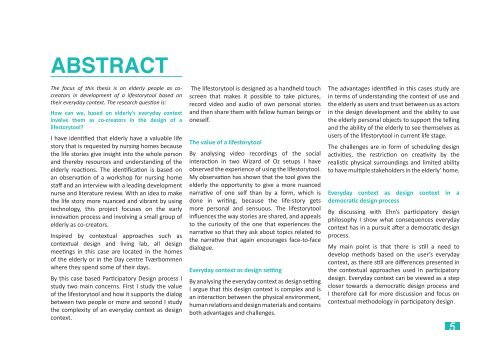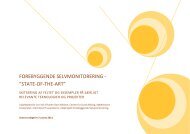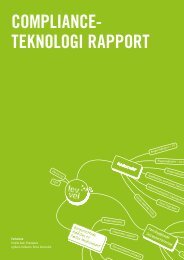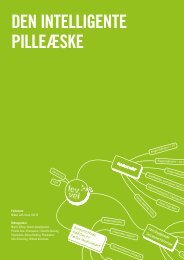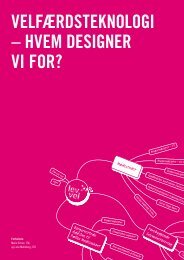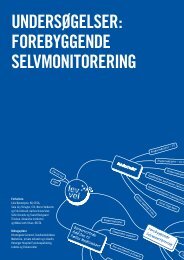Hverdagskontekst som designkontekst - Lev Vel
Hverdagskontekst som designkontekst - Lev Vel
Hverdagskontekst som designkontekst - Lev Vel
Create successful ePaper yourself
Turn your PDF publications into a flip-book with our unique Google optimized e-Paper software.
ABSTRACT<br />
The focus of this thesis is on elderly people as cocreators<br />
in development of a lifestorytool based on<br />
their everyday context. The research question is:<br />
How can we, based on elderly’s everyday context<br />
involve them as co-creators in the design of a<br />
lifestorytool?<br />
I have identified that elderly have a valuable life<br />
story that is requested by nursing homes because<br />
the life stories give insight into the whole person<br />
and thereby resources and understanding of the<br />
elderly reactions. The identification is based on<br />
an observation of a workshop for nursing home<br />
staff and an interview with a leading development<br />
nurse and literature review. With an idea to make<br />
the life story more nuanced and vibrant by using<br />
technology, this project focuses on the early<br />
innovation process and involving a small group of<br />
elderly as co-creators.<br />
Inspired by contextual approaches such as<br />
contextual design and living lab, all design<br />
meetings in this case are located in the homes<br />
of the elderly or in the Day centre Tværbommen<br />
where they spend <strong>som</strong>e of their days.<br />
By this case based Participatory Design process I<br />
study two main concerns. First I study the value<br />
of the lifestorytool and how it supports the dialog<br />
between two people or more and second I study<br />
the complexity of an everyday context as design<br />
context.<br />
The lifestorytool is designed as a handheld touch<br />
screen that makes it possible to take pictures,<br />
record video and audio of own personal stories<br />
and then share them with fellow human beings or<br />
oneself.<br />
The value of a lifestorytool<br />
By analysing video recordings of the social<br />
interaction in two Wizard of Oz setups I have<br />
observed the experience of using the lifestorytool.<br />
My observation has shown that the tool gives the<br />
elderly the opportunity to give a more nuanced<br />
narrative of one self than by a form, which is<br />
done in writing, because the life-story gets<br />
more personal and sensuous. The lifestorytool<br />
influences the way stories are shared, and appeals<br />
to the curiosity of the one that experiences the<br />
narrative so that they ask about topics related to<br />
the narrative that again encourages face-to-face<br />
dialogue.<br />
Everyday context as design setting<br />
By analysing the everyday context as design setting<br />
I argue that this design context is complex and is<br />
an interaction between the physical environment,<br />
human relations and design materials and contains<br />
both advantages and challenges.<br />
The advantages identified in this cases study are<br />
in terms of understanding the context of use and<br />
the elderly as users and trust between us as actors<br />
in the design development and the ability to use<br />
the elderly personal objects to support the telling<br />
and the ability of the elderly to see themselves as<br />
users of the lifestorytool in current life stage.<br />
The challenges are in form of scheduling design<br />
activities, the restriction on creativity by the<br />
realistic physical surroundings and limited ability<br />
to have multiple stakeholders in the elderly’ home.<br />
Everyday context as design context in a<br />
democratic design process<br />
By discussing with Ehn’s participatory design<br />
philosophy I show what consequences everyday<br />
context has in a pursuit after a democratic design<br />
process.<br />
My main point is that there is still a need to<br />
develop methods based on the user’s everyday<br />
context, as there still are differences presented in<br />
the contextual approaches used in participatory<br />
design. Everyday context can be viewed as a step<br />
closer towards a democratic design process and<br />
I therefore call for more discussion and focus on<br />
contextual methodology in participatory design.<br />
5


